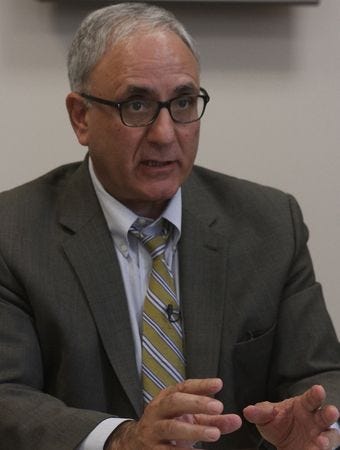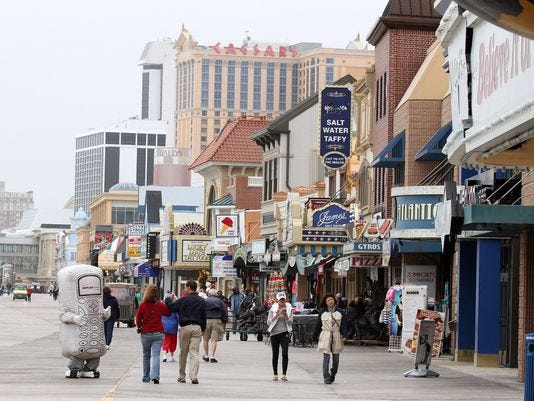ATLANTIC CITY, N.J. -- It was what everyone was talking about in the fall of 1976, in and around Atlantic City, N.J.: A statewide referendum that would allow legalized gambling in the so-called "Queen of Resorts," a once-thriving coastal community that had fallen on hard times.
Gambling, many thought, would be a boon to the struggling city with nearly 20% unemployment, restoring it to its early 20th-century glory. Eve Davis, 51, was born and raised in Atlantic City, and remembers how strongly her parents supported the referendum.
"My family believed it was what was going to save the city," said Davis, a cocktail server at the Showboat casino who now lives in nearby Ventnor, N.J. "It was going to bring great jobs."
STORY: Atlantic City losing to Walmart-style casinos in Pa.
STORY: Will online gambling help or hurt Atlantic City?
The casinos did breathe new life into Atlantic City's tourism industry, with the number of visitors jumping from about 7 million annually to more than 30 million today. And gambling did create jobs: nearly 43,000 at the casinos' peak, in 2006. That's declined to about 33,000 as Atlantic City has struggled to compete with casinos in neighboring states.
But the arrival of casinos has not fixed the deep-seated social problems plaguing a city where nearly 30% of residents live below the poverty line. Unemployment remains high, at nearly 18% last year. Gangs roam in low-income neighborhoods, and the crime rate in 2011 was 107.2 incident per 1,000 residents, compared with 39.3 for Atlantic County.
And the very government agency created to help city residents has since changed its focus — to helping casinos attract more gamblers and visitors.
"In hindsight yes, one of the things that we learned in Atlantic City, whether it's gambling or other economic development, (is that) economic development in and of itself is not a cure for social problems," said Jim Whelan, a former Atlantic City mayor who is now a Democratic state senator.
"The hardcore unemployed are a social problem. It's not an economic problem," said Whelan, who has taught in Atlantic City's public schools for 35 years. "The help-wanted sign does not solve that problem. People don't have the life skills, the job skills, to function in the workplace."
$2 billion spent
The New Jersey Legislature realized early on that while casinos were funneling large sums of money into state coffers, they were reinvesting almost nothing in the city itself.
The 1977 Casino Control Act, a law enacted after the gambling referendum was adopted, called on all casinos to reinvest 2% of their gross gaming revenue annually in Atlantic City.
“The hardcore unemployed are a social problem. It's not an economic problem.”
— Jim Whelan, former Atlantic City mayor now a state senatorBut by 1984, no casino licensee had made the required reinvestments, so legislators created the Casino Reinvestment Development Authority (CRDA) to force the funding. The law gave the casinos a choice: either pay 2.5% of its gaming revenue to the state, or reinvest 1.25% of revenue in community projects through CRDA. Not surprisingly, all casinos chose reinvestment.
Since 1984, the authority invested more than $2 billion in more than 400 projects. The majority of that money — more than $1.5 billion — went to projects within Atlantic City. The authority has had some notable successes, in particular a housing and retail development that transformed the city's dilapidated Northeast Inlet section.
But the agency has been criticized for investing in politically connected projects and for taking a piecemeal approach to redevelopment that leaves large swaths of depressed Atlantic City untouched.
FULL COVERAGE: Special Report: Going for broke
Initially, CRDA focused on developing low- and moderate-income housing in the city, but in 1993, the Legislature expanded the type of projects the authority could fund. A previous prohibition on using CRDA funds for casino development was removed by legislators, allowing CRDA to provide funding for casino hotel rooms.
Recently, CRDA has shifted a substantial portion of its funding to economic development projects aimed at helping keep the city competitive with other tourism and gaming destinations.
Susan NeyThompson, CRDA's deputy executive director, said the agency's role has broadened to make sure there are enough hotel rooms to lure regional conventions, she said.
"All of that really makes Atlantic City a viable place, (but) we're also creating jobs, and we've created neighborhoods through capital investment," said NeyThompson. The first housing project built through a partnership between CRDA and a casino was Jacobs Family Terrace, a community of affordable condominiums built in the early 1980s.
CRDA Executive Director John F. Palmieri said the authority aims to bridge the gap with financing to help make building affordable housing feasible.
Casinos may not have revitalized all of Atlantic City, but "40,000 jobs are here that would not exist" if gambling had not come, NeyThompson said.
'They didn't care about Atlantic City'
Bob McDevitt, president of Unite Here Local 54, the casino workers' union, said the Casino Reinvestment Development Authority has been unsuccessful in its attempts to fully redevelop Atlantic City.
"CRDA was a brilliant way to try to redevelop the city, but they never did it," said McDevitt, who grew up in nearby Ventnor Heights and now lives in Atlantic City. "Their projects have been all fragmented and broken up. And for a very long time, it was dominated by local people, and the decisions they made were clearly political in nature."
The gambling industry created jobs, McDevitt said, but most of the people who work in the casinos choose to live outside the city. Nearby bedroom communities such as Galloway, Egg Harbor and Little Egg Harbor boomed. Atlantic City, for the most part, did not.

Casino Reinvestment Development Authority Executive Director John Palmieri said the casinos built in the 1970s and '80s largely ignored the boardwalk and the beach for which Atlantic City had first become famous.(Photo: Mark R. Sullivan, (East Brunswick, N.J.) Home News Tribune)
"The entire professional class has left," McDevitt said. "They practice here, they work here, but they go home somewhere else."
One of them is Eve Davis, who grew up in the city but now lives in nearby Ventnor. She said she's been disappointed that the casinos have not restored Atlantic City to its former glory.
"They built a box, they put everything in the box, and they wanted you to stay in the box. They didn't care about Atlantic City," Davis said.
Palmieri, CRDA's executive director, agreed.
"The key urban-renewal principles that you would apply are not what we see here," he said.
Palmieri said that the casinos built in the 1970s and 1980s largely ignored the boardwalk and the beach for which Atlantic City had first became famous. Garages and other "back of house-type operations" were placed behind the casinos, on the streets leading away from the boardwalk. In addition to being unattractive, this type of construction served to further sever the massive casinos from the rest of the city, he said.
Fixing the perception of crime
Palmieri said CRDA wants to create a clean and safe environment for visitors to Atlantic City. The agency has worked with the police department to improve safety, and is funding lighting and streetscape improvements along the boardwalk and on neighboring streets. About $45 million has been committed to a casino convention center that has yet to find private investors to foot the rest of the $150 million cost.
Many of the merchants on Atlantic Avenue, for years the city's main shopping strip, strongly championed the arrival of casinos. Most of those same merchants eventually went out of business as the city's population continued to shrink.
"When the malls opened up in the 1970s and 1980s, retailing was in significant decline" in most urban areas, according to economist James W. Hughes, dean of the Edward J. Bloustein School of Planning and Public Policy at Rutgers University in New Brunswick, N.J. "The in-town purchasing power was not enough to support retail."
Indeed, Atlantic City did not even have a supermarket within the city limits for more than six years, until Save-a-Lot opened in May 2012.
Money poured into Atlantic City in the early years of casinos, with property taxes and other fees paid by the new businesses flooding the city's coffers. Atlantic City's budget swelled to about $244 million. By comparison, Camden, N.J., a city with about 77,000 people, has a $167 million budget.
“CRDA was a brilliant way to try to redevelop the city, but they never did it.”
— Bob McDevitt, president of Unite Here Local 54, the casino workers' unionThe 2009 report on the city by the Federal Reserve Bank of Philadelphia noted that property tax revenue soared by more than 400% between 1978 and 2001. But Atlantic City also saw increased expenses from a rise in tourism, including more criminal activity and greater stresses on infrastructure, including local roads, the report noted. The city has more than 300 police officers.
In a city with a long history of corruption that's been immortalized in the HBO series Boardwalk Empire, it's perhaps not surprising that five of the past nine mayors have pleaded guilty to a crime, from corruption to illegally collecting veterans' benefits.
City and police officials have pointed out that although the crime rate is calculated using Atlantic City's population of fewer than 40,000 residents, it does not take into account the nearly 30 million people who visit the city each year.
Dolores Wright, 78, who lives at Best of Life Park senior-citizen apartments, said the city needs more police to control crime and help convince tourists that they'll be safe if they visit. "They need to get the state police in here to control it," she said.
Through a task force formed by the state Attorney General's Office, Atlantic City has increased police patrols in the tourism district and hired special officers to work there. The Casino Reinvestment Development Authority also has paid for 60 "ambassadors," who provide guidance to visitors on the boardwalk and nearby streets.
"It's much safer in the tourism district since we're here," said Kevin Wright, 54, one of the authority's ambassadors. "We don't do security but we can do first aid. And people ask us for directions, or where's the best place to get something good to eat."
Atlantic City quick facts
Population: 1970 — 47,859; 2011 (est.) — 39,558
Percent below the poverty line: 1970 — 22.5%; 2011 — 29.3%
Unemployment rate: 1977 — 18.1%; 2012 — 17.8%
Median household income: 1970 — $4,257 (New Jersey, $10,371); 2011 (est.) — $28,526 (New Jersey, $71,180)
Violent crime rate per 1,000 residents: Atlantic City 2011 — 19.2; New Jersey — 3.1
| < Prev | Next > |
|---|







 Copyright © 2024 ToCasino.net Online Casino. All Rights Reserved. Designed by
Copyright © 2024 ToCasino.net Online Casino. All Rights Reserved. Designed by